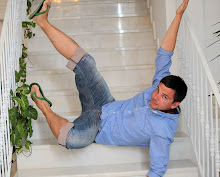And so we reach Thor, the next introduction piece in the Avengers universe. As you might expect from a film about a God with a massive hammer it’s not exactly grounded in realism. From the moment the film starts up it’s clear that this isn’t a Nolan-esque origins story, but if you invest into the spirit of it all it easily ranks alongside the first (and better) Iron Man, and arguably even exceeds it.
Asgard, the realm where Thor is from, is beautifully realized, if a little overly CGI’d. Towering and architecturally stunning structures loom over an idealistic plain that reminded me of Naboo from The Phantom Menace but benefiting from the advancement in technology that ten years gives. The rainbow bridge that leads to the gateway to the other realms is visually impressive, standing out and becoming an instantly memorable image to add to the fantastical cinema archives. The inhabitants of Asgard are all big beards and stupid haircuts, dressed up to the nines in colourful armour and massive boots. In fact, if I were writing a Time Out guide for Asgard, the best way to sum it up would be to explain that as I lay in bed after watching Thor, I couldn’t shake thoughts of Flash Gordon. Camp, colourful, over the top, tongue firmly in cheek and all in all a bit daft. It does all work rather well though, the contrast between the arid desert plains of Earth and the lavishly coloured fantasy other-world from where out hero hails gives the film an extra edge.
This isn’t an advert for a long and dirty weekend in a Godly realm though, it’s a story of how Thor became the hero that would soon get the call-up for The Avengers. Thor, played by Chris Hemsworth (formerly of Home and Away I am told), seemingly genitcally built to play a massive Scandinavian hulk of muscle with a beard, is about to become King of his realm, the crown being passed to him by his father Odin (Anthony Hopkins having the time of his life hamming it up like you wouldn’t believe and looking like Arnie in armour that must be padded with the muscle of several horses). Only just as he’s about to become king, he gets a bit cocky and arrogant and reignites an age old war with the Ice Giants (yes, you really must enter in to the spirit of it all). Odin, understandably is a bit irritated by this threat to peace and outcasts his son down to Earth to live as a mortal until he learns his lesson.
We then follow Thor the mortal, as he gets picked up in the desert by Natalie Portman’s scientist Jane Foster, and her pals Stellan Skarsgard and Kat Dennings. His new friends help him as he tries to get his powers back and save Earth from destruction, as the hands of his brother Loki (Tom Hiddleston adding to the Flash Gordon vibe with a sprinkling of Zod from Superman 2). Standard superhero fare. Although with a nice touch of humour. The main laughs from the film come from Thor’s usually acceptable godly arrogance not quite fitting with rural American custom. The ‘California Man’ approach. Hemsworth does it all well enough and through this managed to quickly win me over, as Thor’s arrogance at the outset is far from endearing. Although this could be jealousy because he looks very impressive without his top on.
Portman though looks a little lost, or perhaps just wasted (I don’t mean drunk of course). Her role is pretty irritating, but saved from the fact that we know it’s Portman
That said, that really is my only gripe with the film. It’s great fun, the action is superbly done although you don't ever really think Thor isn't going to be victorious (I suppose it's the problem with a superhero film where you have a God involved, which is likely to continue when you look at how nigh-on invincible the other Avengers are - how does one get around that?), the comedy fits nicely, it’s all handled very well by Kenneth Branagh, who I wouldn’t have thought was the most obvious choice for this project, but hats off to the man. It’s tone is pitch perfect, standing comfortably alongside the Iron Man films making this build up to The Avengers feel like a proper series. I don’t want to tempt fate but it does appear that they are doing a very decent job at building nicely towards that 2012 release. Going back to how I kicked off this review, it has increased my excitement levels for the big one, not to boiling point but it’s simmering nicely. It’s not done anything to address concerns with the light-hearted tone of this run of films though…..
Next up Captain America. What have you got for us skipper?


